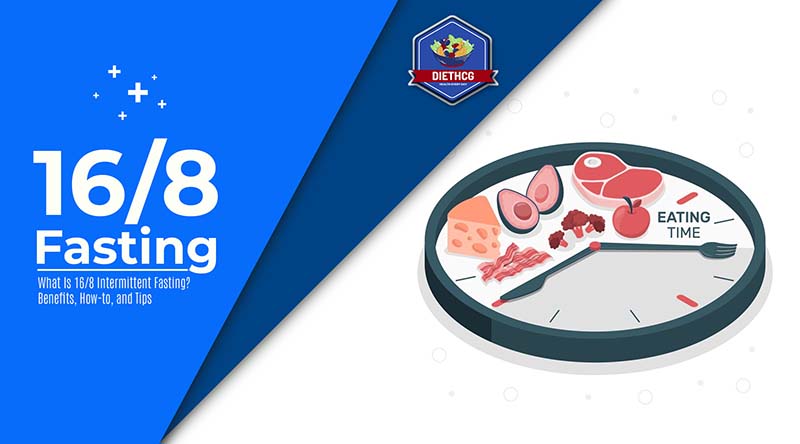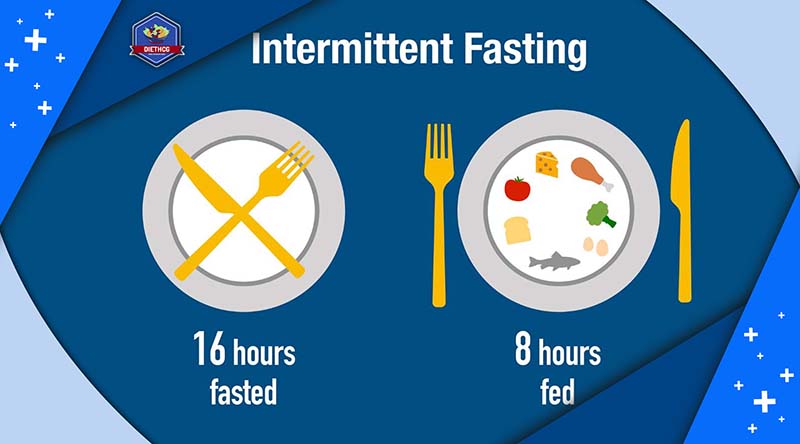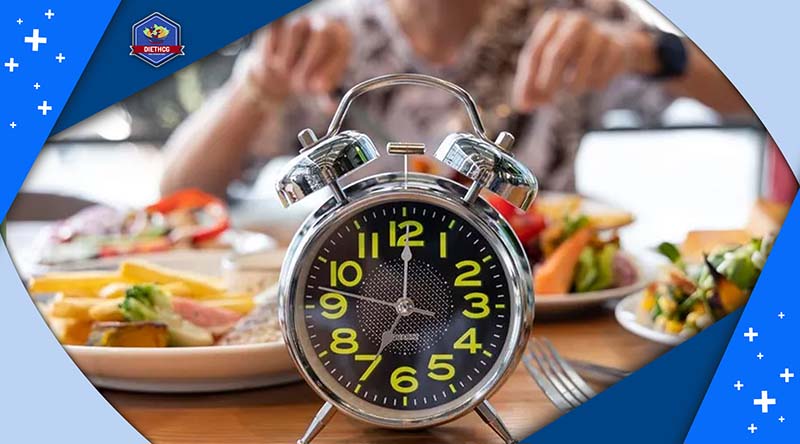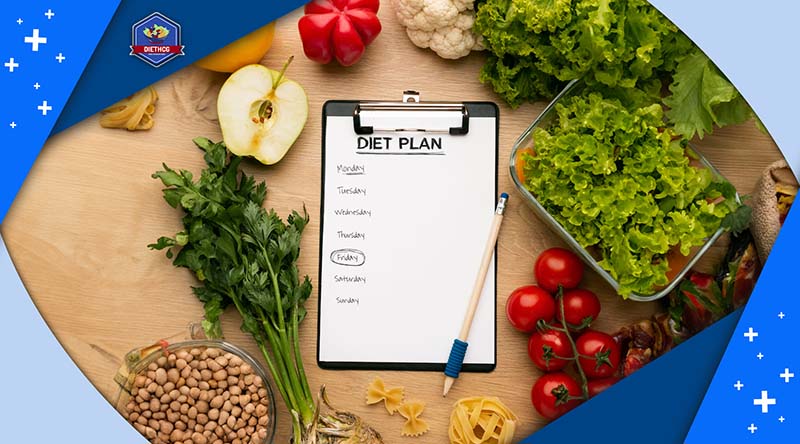What is 16/8 Intermittent Fasting? Intermittent fasting restricts your food consumption to specific hours of the day, gaining popularity for its potential in weight management and enhancing overall wellness. For those looking to shed pounds, selecting appropriate foods during your eating periods can significantly impact your success.
Historically, fasting has played a crucial role across various cultures and religions globally, symbolizing purification and self-discipline for millennia.
In modern times, this age-old practice has been reimagined through various approaches, introducing novel twists to traditional fasting methods.
Among these contemporary methods, 16/8 intermittent fasting stands out as a favored choice. Its advocates believe it offers a straightforward, practical, and enduring strategy for weight reduction and health optimization.
In this article, DietHCG explores the specifics of 16/8 intermittent fasting, outlining how to effectively implement this regimen and assess whether it aligns with your health objectives.

1. What Is 16/8 Intermittent Fasting?
The 16/8 intermittent fasting method is a way of eating where you limit when you eat to an 8-hour period each day and don’t eat for the other 16 hours.
This approach is thought to work well because it lines up with your body’s natural clock, also known as your circadian rhythm.
People who do the 16/8 method usually skip eating in the evening, overnight, and part of the morning. They typically eat their meals in the middle part of the day.
One of the perks of this method is that there aren’t strict rules about what or how much you can eat during your 8-hour eating window. This makes it a lot easier for many people to stick with.

2. What Are the Benefits of Intermittent Fasting?
Intermittent fasting, including the 16:8 method, has been studied quite a bit and may offer several health benefits:
2.1 Weight Loss and Fat Loss
Eating only during a specific time frame each day can lead to eating fewer calories and may boost your metabolism. Research from 2023 found that intermittent fasting, when combined with cutting calories, can be an effective way to lose weight.
Another study in 2020 also found that intermittent fasting, like the 16:8 method, could be helpful for people trying to lose weight. But, the study mentioned that we need more long-term research to fully understand the benefits of intermittent fasting.
2.2 Disease Risk Reduction
Intermittent fasting fans think it can lower the chance of getting diseases such as type 2 diabetes, heart problems, and rheumatoid arthritis.
Some studies show that eating in sync with your body’s natural clock by fasting at certain times can improve health and decrease the risk of issues like diabetes, heart disease, and liver problems.
However, a 2023 study says that intermittent fasting doesn’t seem to change blood sugar or blood pressure levels.
2.3 Extended Life Span
There’s some thought that intermittent fasting might help you live longer and have a better quality of life. But, experts note there’s no solid long-term evidence yet that fasting directly impacts aging or life span.
The National Institute on Aging mentions that even after many years of study, it’s still unclear why fasting might help people live longer. There aren’t enough human studies to say for sure if intermittent fasting can make us live longer, so more research is needed.

3. What Are the Limitations of 16/8 Intermittent Fasting?
While 16/8 intermittent fasting comes with its benefits, it’s not without drawbacks and isn’t suitable for everyone. Starting slowly and paying attention to how your body reacts is important, and you should consult a doctor if you have concerns or experience negative effects.
3.1 Overeating and Potential Weight Gain
Eating only during an 8-hour window might lead some people to eat too much during that time, trying to compensate for the hours they didn’t eat. This can cause weight gain, digestive issues, and poor eating habits.
Current research doesn’t show that intermittent fasting is any more effective for weight loss than simply eating less overall. Both approaches can lead to a small amount of weight loss.
If losing weight is your goal, consider eating fewer calories, exercising more, choosing whole foods, or getting enough sleep rather than just fasting to avoid the overeating that can happen.
Also, while you might lose weight during fasting, it’s common to gain it back once you stop fasting.
3.2 Short-term Physical Symptoms
Starting 16/8 intermittent fasting might bring short-term side effects like feeling hungry, weak, and tired. However, these usually go away once you’re used to the fasting schedule.
3.3 Hormonal Changes and Menstrual Cycles
Animal studies suggest that intermittent fasting can cause hormonal shifts and reduce eating, which might affect menstrual cycles and fertility negatively in those with ovaries.
But, these studies are mostly old and done on animals, so we need more human studies to really understand the impact of intermittent fasting on reproductive health.
Postmenopausal individuals might see different effects from intermittent fasting. Menopause can make the body less sensitive to insulin and lead to weight gain, but intermittent fasting might help with these issues.
4. How to Implement the 16/8 Eating Plan for Beginners
If you’re new to 16/8 intermittent fasting, here’s how you can get started:
4.1 Choosing a Time Window
First up, choose an 8-hour period during which you’ll eat all your meals for the day. Common eating windows include:
- 7 a.m. to 3 p.m.
- 9 a.m. to 5 p.m.
- 12 p.m. to 8 p.m.
- 2 p.m. to 10 p.m.
Many find eating from noon to 8 p.m. easy since it means you fast overnight, skip breakfast, but still enjoy lunch, dinner, and snacks. Another popular option is 9 a.m. to 5 p.m., allowing for breakfast, lunch, and an early dinner or substantial snack before fasting.
Feel free to experiment to see what fits your daily routine best. Setting alarms for the start and end of your eating window might help you remember when to eat and when to fast.

4.2 Foods List and Meal Plan
For the best health results during your eating hours, focus on whole, nutritious foods and drinks:
- Fruits: Apples, bananas, berries, oranges, peaches, pears, tomatoes.
- Vegetables: Broccoli, Brussels sprouts, cauliflower, cucumbers, leafy greens.
- Whole Grains: Barley, buckwheat, quinoa, rice, oats.
- Healthy Fats: Olive oil, avocados.
- Protein Sources: Eggs, fish, legumes, meat, poultry, nuts, seeds.
Drink plenty of calorie-free liquids like water, and unsweetened tea and coffee, even during fasting times. These keep you hydrated and can help manage hunger.
Try to limit highly processed foods, such as packaged snacks, fried foods, sugary beverages, and most frozen meals. Eating too much of these can undo the benefits of your 16/8 fasting plan.

5. Frequently Asked Questions
Who should not follow the 16/8 diet?
The 16/8 diet is not recommended for individuals with diabetes, low blood pressure, or eating disorders, as well as pregnant or breastfeeding women, children, teenagers, and those on certain medications.
Can you eat rice on the 16/8 diet, and does it aid in weight loss?
Yes, you can eat rice while following the 16/8 diet. This diet focuses on the timing of meals rather than specific foods. Rice can fit into a balanced diet. For weight loss, the key is overall calorie balance. Whole grain rice like brown rice is preferable for weight loss due to its higher fiber content, which can help you stay full.
6. Conclusion
The question “What is 16/8 intermittent fasting” has been answered in detail in the above article to help you better understand this concept. This approach can lead to weight loss, reduced fat, and a lower risk of certain health issues. It’s important for those practicing 16:8 fasting to eat plenty of high-fiber whole foods and drink lots of water throughout the day.
However, this fasting plan isn’t suitable for everyone. If you’re considering the 16:8 method, especially if you have health concerns or conditions, it’s wise to consult with a healthcare professional or a dietitian first.


